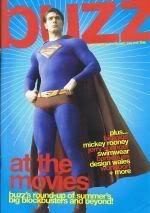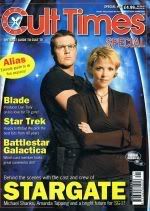The Incredible Hulk (2008)
 There are some superheroes who really don't need much by way of introduction. We all know that Superman's from Krypton; that Spider-Man was bitten by some kind of scienced-up spider; and that Bruce Banner, when he gets angry, becomes the Hulk. So it's hugely refreshing when, instead of rehashing the same old tired origin story all over again, The Incredible Hulk dispenses with the pleasantries and gets all that gamma ray stuff out of the way during the credits sequence.
There are some superheroes who really don't need much by way of introduction. We all know that Superman's from Krypton; that Spider-Man was bitten by some kind of scienced-up spider; and that Bruce Banner, when he gets angry, becomes the Hulk. So it's hugely refreshing when, instead of rehashing the same old tired origin story all over again, The Incredible Hulk dispenses with the pleasantries and gets all that gamma ray stuff out of the way during the credits sequence.
However, while it's very cool that the film acknowledged that what's cool about superheroes is what they do after they've got their powers, it's kind of unfortunate that instead the filmmakers spent most of this film telling the origin story of Abomination instead.
I'll hold my hands up here and admit that I know precisely sod all about Abomination from the comics - and I'm not sure I'm any the wiser after the movie. A loose three-act structure falls into place around Abomination's (or, in his human form, Emil Blonsky's) encounters with the Hulk/Bruce Banner; some other stuff happens along the way, but the three fights between Blonsky and Banner are the tentpoles that the rest of the film is draped over. Um, but to just stretch that metaphor a little further than it can comfortably go - they're crooked. Obviously, each fight is bigger and more destructive than the last, but each successive fight is also much less involving because there's more and more CGI every time the two of them face off.
And, oh, the CGI. If you've seen the trailers or posters or promotional images for this movie, you already know what it looks like - and it's not pretty. It's all very accomplished, and there are scenes involving rain just to show off all those not-quite-realistic-looking textures, but the fight scenes never look like anything other than a computer game. It never looks real, and there's never anything at stake; admiring the technical skill of the graphic artists is about as close as you'll ever get to feeling any real emotion during this film.
Ang Lee's Hulk has mostly been criticised for including too much drama and not enough superhero. This version of The Incredible Hulk features plenty of the green guy, but there's never really any point to it. Edward Norton might as well be sleepwalking through his scenes as Bruce, and Liv Tyler as Betty is completely devoid of personality - she's supposed to be a doctor, she's General Ross's daughter, there's plenty of material to work with, but she only ever gets to play the generic teary-eyed love interest for the anti-hero here. And a curiously lacking in chemistry love interest, at that. Ross's maniacal vendetta against the Hulk is supremely unthreatening, and Abomination's motives for wanting to fight seem to have been ripped straight out of Dragonball Z. Actually, the final fight scene is very reminiscent of that particular anime series: it's just two obscenely muscular men, with muscles piled on top of muscles where no human being should have muscles, facing off against one another purely for the sake of seeing who's stronger. I'm amazed neither of their power levels approached nine thousand, but I guess the inevitable "Hulk smash!" moment was a decent substitute for that.
There are a couple of very geeky nods to the fanbase in this movie - from the Nick Fury and Stark Industries name checks during the beginning credits to Bruce's refusal to even try on his iconic purple trunks - but then even Fantastic Four did things like that. And sometimes The Incredible Hulk gets it wrong, anyway; in the movie, Samuel Sterns is a highly intelligent scientist (even if he is a bit misguided, and working with substandard equipment) whereas in the comics he was, at best, an inept menial worker. Stan Lee's obligatory cameo was just bizarre (who was he supposed to be, and what was he doing there?) and though it's pretty cool of them to get Lou Ferrigno involved, the fact that I can remember more about the cameos and geeky winks than anything else about the film can't be a good sign.
It's only been a couple of hours since I saw The Incredible Hulk, and already the memory is fading. In the grand scheme of Marvel superhero movies, this was never going to be Spider-man 2, but I thought it might at least give Ghost Rider a run for his money. Actually, this probably should be placed underneath the Fantastic Four movies in the stack: it's not particularly clever, it's not particularly entertaining, and it somehow lacks any kind of emotional resonance whatsoever. Really, I wasn't expecting a Hulk movie to be anything other than a bit of brainless, fast-paced entertainment, but at a whopping 114 minutes in which virtually nothing real happens, it fails even at that. It's a damp squib.
Finally, at the screening I attended, the scene featuring Tony Stark came right before the credits, which seemed weird since the final, please-let-us-do-a-sequel moment had already happened and the screen had faded to black. I stayed until all the credits had rolled, and there was nothing afterwards, so I wonder whether, in the proper theatrical release, the random, pointless Tony Stark part will come after the credits? Personally, I don't think I could be bothered to go and see it again to find out.
Originally published at Den of Geek.










1 comment:
In the theatrical release, the Stark moment came before the credits as well; I suspect it was originally a post-credits stinger, but after the box-office performance of 'Iron Man' (and the complaints from people who missed the stinger there), they moved it up a bit to make sure people saw it.
And the origin of the Abomination is completely different from the comics; not surprising, really, since the Abomination was created during the Cold War, and let's just say it's significant that he's named "Emil Blonsky". :) It's one of those things that just had to be changed if you wanted to set the film in the present day.
Other than that, pretty much spot on--I liked the film a bit more than you, perhaps, but I'm a bit more attached to the character, so I bring that emotional investment to the theater sight unseen. The film-makers shouldn't count on that.
Post a Comment